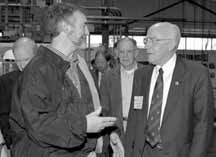 |
|
Congressman Ehlers Vists Fermilab by Judy Jackson "Als U Nederlander bent, spreekt U nog Nederlands?" asked U.S. Congressman Vern Ehlers of Michigan. He was speaking to DZero cospokesperson Harry Weerts, a professor at Michigan State University, a citizen of the Netherlands, and one of Ehlers's tour guides for the congressman's December 8 visit to Fermilab. "Natuurlijk spreek ik nog Nederlands. Wat is een Nederlander die zijn moedertaal niet praat ?" Weerts replied. Roughly translated, Ehlers, of Dutch ancestry, asked Weerts, "If you are from the Netherlands, do you speak Dutch?"
To which Weerts replied, "Of course I speak Dutch, I am Dutch."
"I was rather surprised," Weerts said later.
"I calculate that at this doubling rate, by 2028 the entire Congress will consist of physicists," Ehlers told a standing-room-only crowd at Fermilab--an audience who clearly felt such a demographic shift would be highly desirable. Meanwhile, Ehlers told the Fermilab scientists, Congress has little understanding of science--and when it comes to politics, scientists are "clueless." To help bridge the gap, he urged physicists to become more politically involved, not simply by making their traditional evangelizing trips to Washington, but by donating to election campaigns and volunteering time to help candidates they support.
The former Calvin College physics professor described his own entry into national politics, a career he had not envisioned, via local political involvement in his home town of Grand Rapids. He recalled sending a letter to his then-congressman, another son of Grand Rapids, Gerald Ford, in which he offered free scientific advice if Ford should ever want it. "I expected to receive a polite form letter in reply," Ehlers said. Instead, Ford called him the next day, asking him to become his scientific advisor. Thereafter, Ehlers and other scientific colleagues met regularly with Ford, who told Ehlers he enjoyed these scientific gatherings, because "you are the only people who ever visit me who aren't asking for anything." Fermilab physicists, however, cannot be counted among those who aren't asking for anything from Congress, as their questions to the congressman indicated. Ehlers sympathized with the difficulty they expressed in communicating the benefits of particle physics in persuasive terms, and of garnering congressional support for expensive new scientific facilities. A member of the House Science Committee and the author of a recent science policy study, Ehlers demonstrated his familiarity with such issues. Ehlers cited the late California Congressman George Brown's assertion that the United States does not have a science policy, but rather a budget policy for science. In an effort to address the national science policy vacuum, and at the request of former House Speaker Newt Gingrich, Ehlers led the 1998 Science Committee effort that produced the well-received report, "Unlocking Our Future: Toward a New National Science Policy." The 74-page report addresses major themes including the contribution of science to policy-making and the importance of strengthening and sustaining science in the United States. It stresses the importance of making "stable and substantial federal funding for fundamental science a high priority" and advocates spreading research funds over a "broad spectrum of scientific disciplines, mathematics, and engineering." Ehlers received high marks from Fermilab scientists who crowded the One West lecture hall to hear him speak. Many seemed amazed to encounter a congressman with Ehlers's grasp of the issues currently confronting U.S. research in basic science. "He really gets it, doesn't he?" marveled one experimenter. Mr. Ehlers U bent altijd van harte welkom in Fermilab. That's Dutch for "Mr. Ehlers, y'all come back." |
| last modified 1/14/2000 email Fermilab |
FRLsDFx9eyfrPXgV
